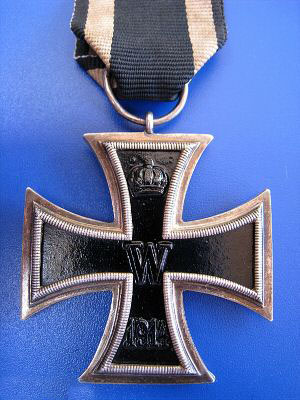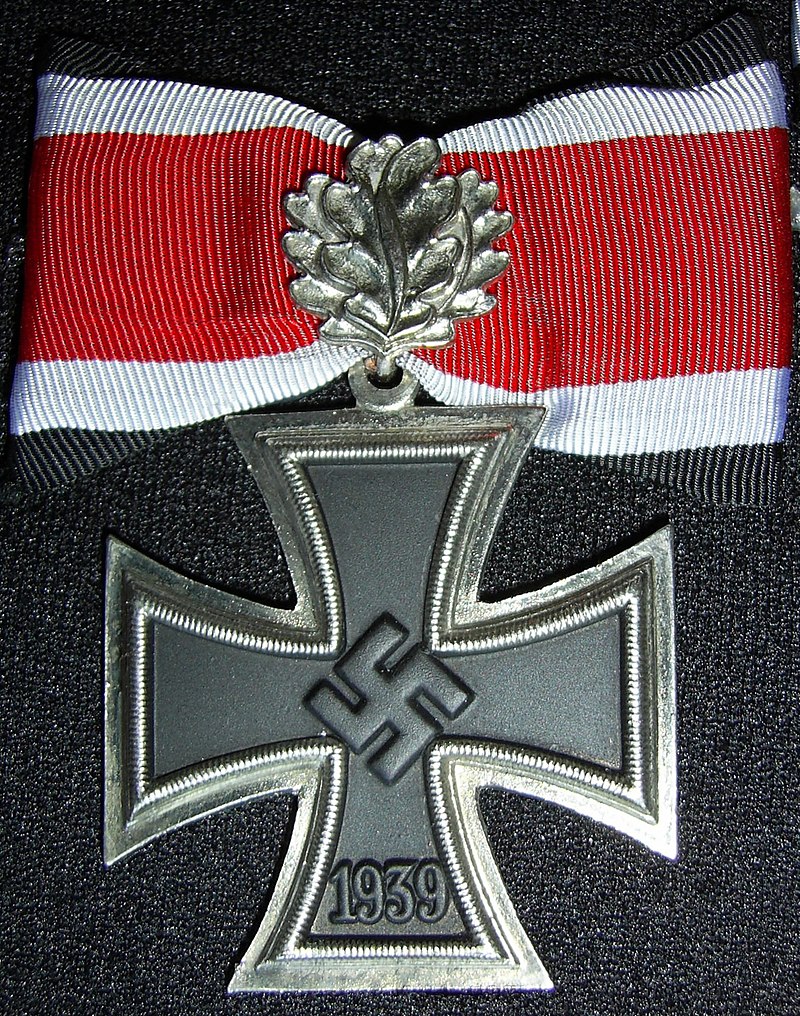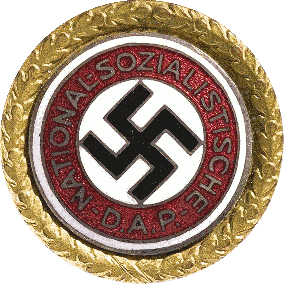Jodl, Alfred Josef Ferdinand, born in Wurzburg,  on 10-05-1890, fifteen months after Adolf Hitler (did you know) (see Hitler parents)
on 10-05-1890, fifteen months after Adolf Hitler (did you know) (see Hitler parents) 
 , as son of Alfred Jodl Sr. and Therese, born Baumgärtler, who were not yet married at the time of his birth. Until the age of eight he bore his mother’s name, because his parents were not officially married. Therese Baumgärtler, a miller’s daughter, was of low origin. For this reason and because she could not provide the required dowry, Alfred senior’s superiors did not consent to the marriage. The couple had another son Ferdinand Alfred Friedrich,
, as son of Alfred Jodl Sr. and Therese, born Baumgärtler, who were not yet married at the time of his birth. Until the age of eight he bore his mother’s name, because his parents were not officially married. Therese Baumgärtler, a miller’s daughter, was of low origin. For this reason and because she could not provide the required dowry, Alfred senior’s superiors did not consent to the marriage. The couple had another son Ferdinand Alfred Friedrich, 
 the later General and also three daughters, who all died young.
the later General and also three daughters, who all died young.
 on 10-05-1890, fifteen months after Adolf Hitler (did you know) (see Hitler parents)
on 10-05-1890, fifteen months after Adolf Hitler (did you know) (see Hitler parents) 
 , as son of Alfred Jodl Sr. and Therese, born Baumgärtler, who were not yet married at the time of his birth. Until the age of eight he bore his mother’s name, because his parents were not officially married. Therese Baumgärtler, a miller’s daughter, was of low origin. For this reason and because she could not provide the required dowry, Alfred senior’s superiors did not consent to the marriage. The couple had another son Ferdinand Alfred Friedrich,
, as son of Alfred Jodl Sr. and Therese, born Baumgärtler, who were not yet married at the time of his birth. Until the age of eight he bore his mother’s name, because his parents were not officially married. Therese Baumgärtler, a miller’s daughter, was of low origin. For this reason and because she could not provide the required dowry, Alfred senior’s superiors did not consent to the marriage. The couple had another son Ferdinand Alfred Friedrich, 
 the later General and also three daughters, who all died young.
the later General and also three daughters, who all died young.In 1899, Alfred’s father left the army and the family moved to Munich. The partners got married there after all. After this, the family had to live on a not very generous officer’s pension and the father’s earnings as an insurance agent. As a result, they were not well off financially. Alfred nevertheless had positive memories of his youth. He and his brother received a strict upbringing. His parents had determined that Alfred should become an officer in the army, like his father. A career choice that the boy could fully agree with.
Alfred attended cadet school and 1910 joined a field military regiment in the German Army. Soon after the outbreak of the First World War Jodl suffered a severe thigh wound.  When his battery was felled at Azerailles in August 1914, a piece of shrapnel pierced his right thigh, which earned him a few months in a hospital and later, because the splinter could not be removed and the wound began to fester, almost cost him his leg. He recovered and saw further action on the Western Front and in 1917 Jodl served briefly on the Easter Front before returning to the west as a staff officer. Disillusioned by Germany’s defeat he considered leaving the army and becoming a doctor, but Jodl remained in the armed forces and joined the Versailles-limited Reichswehr.
When his battery was felled at Azerailles in August 1914, a piece of shrapnel pierced his right thigh, which earned him a few months in a hospital and later, because the splinter could not be removed and the wound began to fester, almost cost him his leg. He recovered and saw further action on the Western Front and in 1917 Jodl served briefly on the Easter Front before returning to the west as a staff officer. Disillusioned by Germany’s defeat he considered leaving the army and becoming a doctor, but Jodl remained in the armed forces and joined the Versailles-limited Reichswehr.  Jodl had married Irma Pauline Karoline Gräfin von Bullion
Jodl had married Irma Pauline Karoline Gräfin von Bullion  , a woman five years his senior from an aristocratic Swabian family, in September 1913
, a woman five years his senior from an aristocratic Swabian family, in September 1913  She born 16-08-1885 died in Königsberg from pneumonia, on 17-04-1944, aged 58. contracted after major spinal surgery. In November 1944, Jodl married Luise Katharina von Benda
She born 16-08-1885 died in Königsberg from pneumonia, on 17-04-1944, aged 58. contracted after major spinal surgery. In November 1944, Jodl married Luise Katharina von Benda
 When his battery was felled at Azerailles in August 1914, a piece of shrapnel pierced his right thigh, which earned him a few months in a hospital and later, because the splinter could not be removed and the wound began to fester, almost cost him his leg. He recovered and saw further action on the Western Front and in 1917 Jodl served briefly on the Easter Front before returning to the west as a staff officer. Disillusioned by Germany’s defeat he considered leaving the army and becoming a doctor, but Jodl remained in the armed forces and joined the Versailles-limited Reichswehr.
When his battery was felled at Azerailles in August 1914, a piece of shrapnel pierced his right thigh, which earned him a few months in a hospital and later, because the splinter could not be removed and the wound began to fester, almost cost him his leg. He recovered and saw further action on the Western Front and in 1917 Jodl served briefly on the Easter Front before returning to the west as a staff officer. Disillusioned by Germany’s defeat he considered leaving the army and becoming a doctor, but Jodl remained in the armed forces and joined the Versailles-limited Reichswehr.  Jodl had married Irma Pauline Karoline Gräfin von Bullion
Jodl had married Irma Pauline Karoline Gräfin von Bullion  , a woman five years his senior from an aristocratic Swabian family, in September 1913
, a woman five years his senior from an aristocratic Swabian family, in September 1913  She born 16-08-1885 died in Königsberg from pneumonia, on 17-04-1944, aged 58. contracted after major spinal surgery. In November 1944, Jodl married Luise Katharina von Benda
She born 16-08-1885 died in Königsberg from pneumonia, on 17-04-1944, aged 58. contracted after major spinal surgery. In November 1944, Jodl married Luise Katharina von Benda

 , a family friend his long-time admirer and she became his secretary, she died in 1998, old age 93. In 1935 Jodl was promoted to the rank of Generalmajor. After the Anschluss, Annexation, he was sent to Vienna as head of the 44th Artillery Command. He returned to Germany and in September he took part in the invasion of Poland. A strong supporter of the National Socialist German Workers Party (NSDAP)
, a family friend his long-time admirer and she became his secretary, she died in 1998, old age 93. In 1935 Jodl was promoted to the rank of Generalmajor. After the Anschluss, Annexation, he was sent to Vienna as head of the 44th Artillery Command. He returned to Germany and in September he took part in the invasion of Poland. A strong supporter of the National Socialist German Workers Party (NSDAP)  , Jodl worked closely with Adolf Hitler and in October, 1939, was appointed Chief of Operations.
, Jodl worked closely with Adolf Hitler and in October, 1939, was appointed Chief of Operations.

 During the Battle of Britain (see Bomber Arthur Harris)
During the Battle of Britain (see Bomber Arthur Harris) 
 Jodl was optimistic of Britain’s demise and on 30-06-1940 wrote “The final German victory over England is now only a question of time.” In January, 1944, Jodl was promoted to the rank of Generaloberst, acting as deputy to Wilhelm Keitel.
Jodl was optimistic of Britain’s demise and on 30-06-1940 wrote “The final German victory over England is now only a question of time.” In January, 1944, Jodl was promoted to the rank of Generaloberst, acting as deputy to Wilhelm Keitel.
 Jodl came close to be killed when the bomb exploded in the July Plot, 1944.
Jodl came close to be killed when the bomb exploded in the July Plot, 1944.

 Generaloberst der Flieger, Stafchef of the Luftwaffe, Günther Korten
Generaloberst der Flieger, Stafchef of the Luftwaffe, Günther Korten  and General der Infanterie, Rudolf Schmundt
and General der Infanterie, Rudolf Schmundt  were killed. He recovered and on 07-05-1945 he signed the unconditional surrender of Germany
were killed. He recovered and on 07-05-1945 he signed the unconditional surrender of Germany



to the Allies as the representative of Gross Admiral, Karl Dönitz,  together with Admiral, Hans-Georg von Friedeburg
together with Admiral, Hans-Georg von Friedeburg  and Generalleutnant der Wehrmacht, Eberhard Kinzel.
and Generalleutnant der Wehrmacht, Eberhard Kinzel.  The officer behind Jodl is General Lieutenant, Sir Kenneth Strong who played a leading part in the negotiations for the unconditional surrender of Germany. Strong died in Eastborne, age 81, on 11-01-1982. Soon afterwards Jodl was arrested and charged with war crimes.
The officer behind Jodl is General Lieutenant, Sir Kenneth Strong who played a leading part in the negotiations for the unconditional surrender of Germany. Strong died in Eastborne, age 81, on 11-01-1982. Soon afterwards Jodl was arrested and charged with war crimes.
 together with Admiral, Hans-Georg von Friedeburg
together with Admiral, Hans-Georg von Friedeburg  and Generalleutnant der Wehrmacht, Eberhard Kinzel.
and Generalleutnant der Wehrmacht, Eberhard Kinzel.  The officer behind Jodl is General Lieutenant, Sir Kenneth Strong who played a leading part in the negotiations for the unconditional surrender of Germany. Strong died in Eastborne, age 81, on 11-01-1982. Soon afterwards Jodl was arrested and charged with war crimes.
The officer behind Jodl is General Lieutenant, Sir Kenneth Strong who played a leading part in the negotiations for the unconditional surrender of Germany. Strong died in Eastborne, age 81, on 11-01-1982. Soon afterwards Jodl was arrested and charged with war crimes.

Death and burial ground of Jodl, Alfred Josef Ferdinand.
At the Nuremberg War Crimes Trial Jodl was charged of approving orders that violated the rules of war.


 Alfred Jodl was found guilty and hanged on 06-10-1946, by the U.S. hangman John Chris Woods. Jodl is cremated on the Ostfriedhof of Munich together with all condemned Nuremberg persons, Joachim von Ribbentrop, Wilhelm Keitel, Julius Streicher, Wilhelm Frick, Arthur Seyss Inquart, Alfred Rosenberg, Ernst Kaltenbrunner and Hans Frank, SS Obergruppenführer, Fritz Sauckel, and Hermann Goering (did you know), Goering committed suicide only hours before his hanging. The ashes were secretly, in the night of 16-10-1946, scattered in the river Isar, from a bridge in Munich, the Reichenbachbrücke.
Alfred Jodl was found guilty and hanged on 06-10-1946, by the U.S. hangman John Chris Woods. Jodl is cremated on the Ostfriedhof of Munich together with all condemned Nuremberg persons, Joachim von Ribbentrop, Wilhelm Keitel, Julius Streicher, Wilhelm Frick, Arthur Seyss Inquart, Alfred Rosenberg, Ernst Kaltenbrunner and Hans Frank, SS Obergruppenführer, Fritz Sauckel, and Hermann Goering (did you know), Goering committed suicide only hours before his hanging. The ashes were secretly, in the night of 16-10-1946, scattered in the river Isar, from a bridge in Munich, the Reichenbachbrücke.



 Veterans say that Jodl’s ashes are bought from the Americans and buried on the Fraueninsel in the Bavarain Chiemsee, next to his wife, Irma Gräfin von Bullion and brother General of the Mountain Troops, Kommandeur Heeresgruppe Narvik, Ferdinand Jodl.
Veterans say that Jodl’s ashes are bought from the Americans and buried on the Fraueninsel in the Bavarain Chiemsee, next to his wife, Irma Gräfin von Bullion and brother General of the Mountain Troops, Kommandeur Heeresgruppe Narvik, Ferdinand Jodl.  It’s the same story as with the ashes and graves of honor for Wilhelm Keitel, in Bad Gandersheim and on Ohlsdorf cemetery in Hamburg and Joachim von Ribbentrop, in Biebrich, Wiesbaden, the family grave of his wife Annelies von Ribbentrop-Henkell.
It’s the same story as with the ashes and graves of honor for Wilhelm Keitel, in Bad Gandersheim and on Ohlsdorf cemetery in Hamburg and Joachim von Ribbentrop, in Biebrich, Wiesbaden, the family grave of his wife Annelies von Ribbentrop-Henkell.Jodl’s conviction was controversial – also among the Allies: the French judge Henri Donnedieu de Vabres 
 called his conviction a miscarriage of justice. In March 1953, a German arbitral commission ruled that he had not been guilty of war crimes but had merely done his duty and had not committed any war crimes. His forfeited property was returned to his widow. Later, in September of that year, under pressure from the Americans, the committee’s advice was revoked by the Bavarian Minister for Political Liberation. In the cemetery of Fraueninsel im Chiemsee there is a crypt of the Jodl family with a memorial stone for the Generaloberst himself, a second for his first wife Irma Countess von Bullion (1885-1944), a third for his second wife Luise von Benda (1905 -1998), and a fourth for his younger brother Ferdinand (1896-1956) and his wife.
called his conviction a miscarriage of justice. In March 1953, a German arbitral commission ruled that he had not been guilty of war crimes but had merely done his duty and had not committed any war crimes. His forfeited property was returned to his widow. Later, in September of that year, under pressure from the Americans, the committee’s advice was revoked by the Bavarian Minister for Political Liberation. In the cemetery of Fraueninsel im Chiemsee there is a crypt of the Jodl family with a memorial stone for the Generaloberst himself, a second for his first wife Irma Countess von Bullion (1885-1944), a third for his second wife Luise von Benda (1905 -1998), and a fourth for his younger brother Ferdinand (1896-1956) and his wife.

 called his conviction a miscarriage of justice. In March 1953, a German arbitral commission ruled that he had not been guilty of war crimes but had merely done his duty and had not committed any war crimes. His forfeited property was returned to his widow. Later, in September of that year, under pressure from the Americans, the committee’s advice was revoked by the Bavarian Minister for Political Liberation. In the cemetery of Fraueninsel im Chiemsee there is a crypt of the Jodl family with a memorial stone for the Generaloberst himself, a second for his first wife Irma Countess von Bullion (1885-1944), a third for his second wife Luise von Benda (1905 -1998), and a fourth for his younger brother Ferdinand (1896-1956) and his wife.
called his conviction a miscarriage of justice. In March 1953, a German arbitral commission ruled that he had not been guilty of war crimes but had merely done his duty and had not committed any war crimes. His forfeited property was returned to his widow. Later, in September of that year, under pressure from the Americans, the committee’s advice was revoked by the Bavarian Minister for Political Liberation. In the cemetery of Fraueninsel im Chiemsee there is a crypt of the Jodl family with a memorial stone for the Generaloberst himself, a second for his first wife Irma Countess von Bullion (1885-1944), a third for his second wife Luise von Benda (1905 -1998), and a fourth for his younger brother Ferdinand (1896-1956) and his wife.


























Leave a Reply